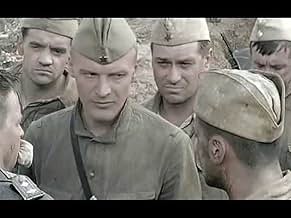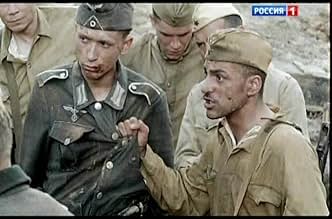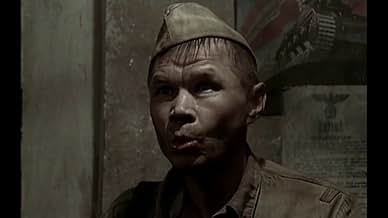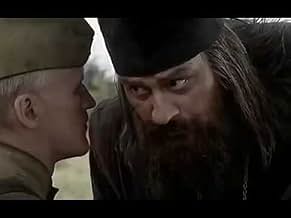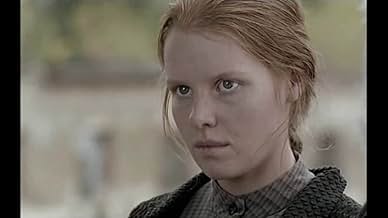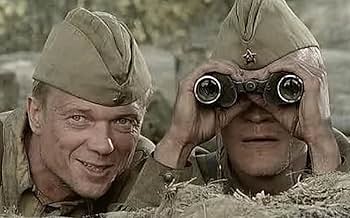Shtrafbat
- Série télévisée
- 2004
- 9h 10m
ÉVALUATION IMDb
7,3/10
1,6 k
MA NOTE
Ajouter une intrigue dans votre langueDrama of the penalty parts of political prisoners, who fought on the Soviet fronts.Drama of the penalty parts of political prisoners, who fought on the Soviet fronts.Drama of the penalty parts of political prisoners, who fought on the Soviet fronts.
- Prix
- 2 nominations au total
Parcourir les épisodes
Avis en vedette
"Shtrafbat" (2004), an 11-part TV series, is about Soviet Army battalions made up of many kinds of prisoners, hoping to be "rehabilitated" of their "crimes".
"Shtrafbat" (Punishment or Penal Battalions) were made up of deserters, political prisoners, and former POWs who had returned from German captivity (according to Stalin: allowing ones-self to be captured alive & imprisoned was akin to surrendering, & surrendering was considered to be treason, a crime punishable by death), and even "regular" criminals sent from prison-camps, so the suspicion that these people wouldn't fight well, or might even surrender, was high. These "criminals" were "graciously" allowed "a second chance" by the government, a chance to "wash away their past sins with their own blood."
These "Shtrafbat" were sent on the most dangerous and difficult missions (i.e. those with low survivability) and were followed into battle by troops who were called "Zagrad-Otryad" (Blocking Troops), and were under NKVD (precursor to the KGB) control. Sometimes these troops were almost as large as the actually fighting units they blocked. They were under orders to shoot any Soviet soldiers who were thought to be retreating, be they wounded or not.
The few "Shtrafbat" soldiers who lived through it for some months, were considered rehabilitated and returned to regular army units. The KIAs were rehabilitated posthumously, sparing their families from being branded as families of traitors, "enemies of the Soviet people."
"Shtrafbat" (Punishment or Penal Battalions) were made up of deserters, political prisoners, and former POWs who had returned from German captivity (according to Stalin: allowing ones-self to be captured alive & imprisoned was akin to surrendering, & surrendering was considered to be treason, a crime punishable by death), and even "regular" criminals sent from prison-camps, so the suspicion that these people wouldn't fight well, or might even surrender, was high. These "criminals" were "graciously" allowed "a second chance" by the government, a chance to "wash away their past sins with their own blood."
These "Shtrafbat" were sent on the most dangerous and difficult missions (i.e. those with low survivability) and were followed into battle by troops who were called "Zagrad-Otryad" (Blocking Troops), and were under NKVD (precursor to the KGB) control. Sometimes these troops were almost as large as the actually fighting units they blocked. They were under orders to shoot any Soviet soldiers who were thought to be retreating, be they wounded or not.
The few "Shtrafbat" soldiers who lived through it for some months, were considered rehabilitated and returned to regular army units. The KIAs were rehabilitated posthumously, sparing their families from being branded as families of traitors, "enemies of the Soviet people."
With the war not going well for the Soviet Union, Stalin accepted volunteers from the prisons and used the prisoners as shock troops. This is the story of one such battalion. There are petty crooks, political prisoners, soldiers kicked out of other units, gray-haired veterans of the White Army plus some dangerous criminals.
They are thrown into battle ill-equipped, untrained and face the threat of the NKVD if they show signs of cowardice or failure.
The special effects are rudimentary and many of the minor characters are one-dimensional, but the overall story is very human and riveting.
I have not seen a version with subtitles or dubbing. Viewing the show required liberal use of the pause button and explanations from a native speaker of Russian.
They are thrown into battle ill-equipped, untrained and face the threat of the NKVD if they show signs of cowardice or failure.
The special effects are rudimentary and many of the minor characters are one-dimensional, but the overall story is very human and riveting.
I have not seen a version with subtitles or dubbing. Viewing the show required liberal use of the pause button and explanations from a native speaker of Russian.
If you're looking for a war series that doesn't just depict battles but truly captures the human cost of war, Strafbat (Penal Battalion) is an absolute must-watch. This 2004 Russian TV series is a brutal, gripping, and deeply emotional portrayal of Soviet penal battalions during World War II-units made up of former prisoners and disgraced soldiers sent on near-suicidal missions to redeem themselves through combat.
Authenticity and Realism One of Strafbat's biggest strengths is its raw realism. Unlike many war dramas that glorify heroism, this series strips war down to its harshest truths-desperation, sacrifice, and the thin line between survival and honor. The production design is immersive, with detailed period-accurate uniforms, weaponry, and locations that make you feel like you're right there in the trenches.
Complex Characters and Morality What sets Strafbat apart is its incredible character depth. The soldiers in the penal battalion aren't your typical heroes-they are criminals, deserters, and men who have lost everything. Yet, as the series progresses, you begin to understand their humanity, their motivations, and the impossible choices they face. Alexey Serebryakov delivers a powerhouse performance as Major Tverdokhlebov, a commander trying to lead men who have been given no hope. His moral struggle, combined with the way the penal battalion members evolve, adds layers of emotional weight to every scene.
A Story of Redemption and Brotherhood Despite its bleak premise, Strafbat isn't just about suffering-it's also about resilience, redemption, and the unbreakable bond between soldiers. These men, who start off as outcasts, form a brotherhood forged in fire. Their camaraderie, defiance, and small victories make their journey deeply compelling.
Cinematic Storytelling From its intense battle sequences to its quieter, character-driven moments, Strafbat is beautifully shot and directed. The cinematography captures both the chaos of war and the haunting stillness in between, while the soundtrack adds to the emotional depth without being overbearing.
Why You Should Watch It If you're a fan of historical dramas that don't shy away from the grim realities of war (Band of Brothers, Come and See, Generation War), Strafbat is a hidden gem. It's an emotionally powerful, thought-provoking series that stays with you long after the final episode. More than just a war story, it's a testament to the strength of the human spirit in the face of impossible odds.
⭐ Final Verdict: 9.5/10 - An absolute masterpiece of war television, blending historical accuracy with raw emotional storytelling. Highly recommended!
Authenticity and Realism One of Strafbat's biggest strengths is its raw realism. Unlike many war dramas that glorify heroism, this series strips war down to its harshest truths-desperation, sacrifice, and the thin line between survival and honor. The production design is immersive, with detailed period-accurate uniforms, weaponry, and locations that make you feel like you're right there in the trenches.
Complex Characters and Morality What sets Strafbat apart is its incredible character depth. The soldiers in the penal battalion aren't your typical heroes-they are criminals, deserters, and men who have lost everything. Yet, as the series progresses, you begin to understand their humanity, their motivations, and the impossible choices they face. Alexey Serebryakov delivers a powerhouse performance as Major Tverdokhlebov, a commander trying to lead men who have been given no hope. His moral struggle, combined with the way the penal battalion members evolve, adds layers of emotional weight to every scene.
A Story of Redemption and Brotherhood Despite its bleak premise, Strafbat isn't just about suffering-it's also about resilience, redemption, and the unbreakable bond between soldiers. These men, who start off as outcasts, form a brotherhood forged in fire. Their camaraderie, defiance, and small victories make their journey deeply compelling.
Cinematic Storytelling From its intense battle sequences to its quieter, character-driven moments, Strafbat is beautifully shot and directed. The cinematography captures both the chaos of war and the haunting stillness in between, while the soundtrack adds to the emotional depth without being overbearing.
Why You Should Watch It If you're a fan of historical dramas that don't shy away from the grim realities of war (Band of Brothers, Come and See, Generation War), Strafbat is a hidden gem. It's an emotionally powerful, thought-provoking series that stays with you long after the final episode. More than just a war story, it's a testament to the strength of the human spirit in the face of impossible odds.
⭐ Final Verdict: 9.5/10 - An absolute masterpiece of war television, blending historical accuracy with raw emotional storytelling. Highly recommended!
Many experienced and excellent actors mixed together in an ongoing plot of an untold part of world war II on the eastern front. Characters well portrayed and unforgettable. One episode leaves you wishing for the next. Pay attention to the closing credits were the thousands of Shtrafbat battalions are listed. An untold story involving hundreds of thousands of individuals. Sometimes brutal, sometimes romantic, always filled with real people and dialog. Produced with excellent sets and camera work. Heroes and villains, criminals and priests, patriots and traitors. Portrait of people struggling to survive and overcome a most terrible time. I wish to buy a copy for my own collection so to be able to enjoy the series repeatedly.
Life in the Soviet Union's penal battalions was horrific, and this series does a wonderful job of portraying the ugly reality for many persons who perished during the second world war. It is not for the faint-hearted, and certainly extremely realistic when it comes to the ugliness of patriarchal society, and the vision men had (have) of women, many times as mere sex-objects. Certainly the series explores the basal level of the ugliness of human nature, which makes it that much more believable.
Its only detriment, is a cheap politicised usage of religion, especially for Russian nationalistic purposes (otherwise it would have merited a "9 star" rating). Overlook it, and the production is truly a masterpiece of war drama.
Le saviez-vous
- ConnexionsReferenced in Comedy Club: Episode #1.13 (2005)
Meilleurs choix
Connectez-vous pour évaluer et surveiller les recommandations personnalisées
Détails
- Durée9 heures 10 minutes
- Couleur
Contribuer à cette page
Suggérer une modification ou ajouter du contenu manquant

Lacune principale
By what name was Shtrafbat (2004) officially released in Canada in English?
Répondre
